Rex Tillerson is the opposite of Donald Trump. Will he have any sway?
- Published
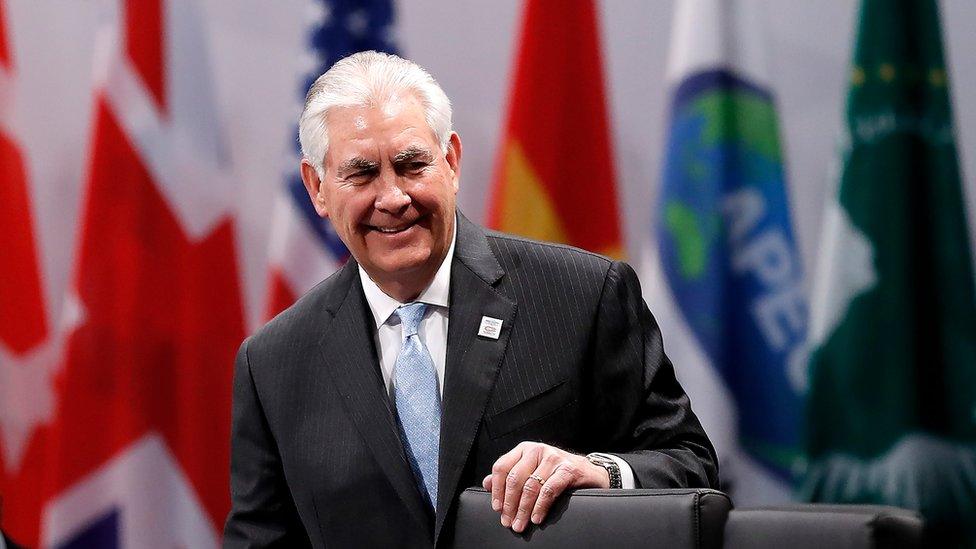
Rex Tillerson is the antithesis of his boss, the Disrupter-in-Chief Donald Trump.
He is also, in some respects, the antithesis of his predecessor, the garrulous former Secretary of State John Kerry.
For the man who is the public face of US diplomacy, Tillerson keeps a remarkably low profile.
Which has left staff at the State Department, and the journalists who cover it, wondering how he will fare against competing power centres in the White House, and how he will represent America to the world.
Early signs have not been promising.
For the entire first month of the Trump administration the State Department has given no public briefings. It's just been announced that they're set to resume early next month after an unprecedented six-week hiatus.
It was not just the matter of being absent from the cacophony of a new order asserting itself in Washington. It was the noticeable absence of an American voice to the world, a tool of diplomacy that has regularly inserted US positions into the internal debates of allies and foes alike.
Tillerson himself has rarely spoken publicly. On his inaugural trip to a G20 Foreign Ministers meeting in Bonn and again in Mexico, he read prepared statements but didn't make room for reporters' questions and didn't respond when we tried to ask them anyway.
This reticence is consistent with both his corporate background as former head of Exxon Mobil, and his personal style - a lifelong Eagle Scout who values actions more than words.
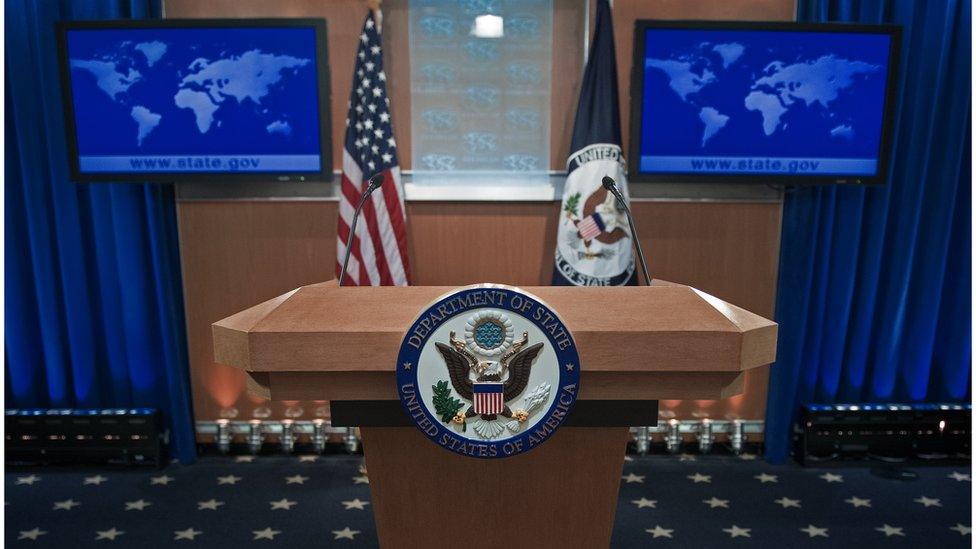
He does at least avoid the pitfalls of Kerry, who thoroughly embraced the public role of top diplomat, but whose shoot-from-the-hip style sometimes left his aides backtracking after he'd departed the podium.
Still, says one State Department employee, "I think Tillerson hurts himself with this quiet diplomacy approach, because Washington is not a quiet town."
This reluctance is perhaps understandable given the freewheeling approach of the noisiest voice in town, the White House. It has, at best, sent mixed signals on key foreign policy issues such as Nato, Russia and China.
But Tillerson's recent absence from Donald Trump's meetings with key foreign leaders has left many questioning just how much influence he has.
State department officials point out that his acting deputy Tom Shannon was in the room for the visits of the Canadian and Japanese Prime Ministers. And that Tillerson was travelling during the official part of Benjamin Netanyahu's Washington trip, so he met the Israeli leader separately before he left.
Yet while they were at dinner, the White House appeared to blindside him with suggestions it might depart from a long-standing insistence on a two-state solution to the Mideast conflict.
"If there's going to be a policy change, the State Department needs to know about it," a US official told the BBC.
To a large degree, Mr Tillerson's understated performance reflects this confusion in the administration over who's in charge.
The National Security Council - the traditional centre of influence in the White House, which usually works closely with the State Department - has been paralysed by staffing shortages and a leadership change.
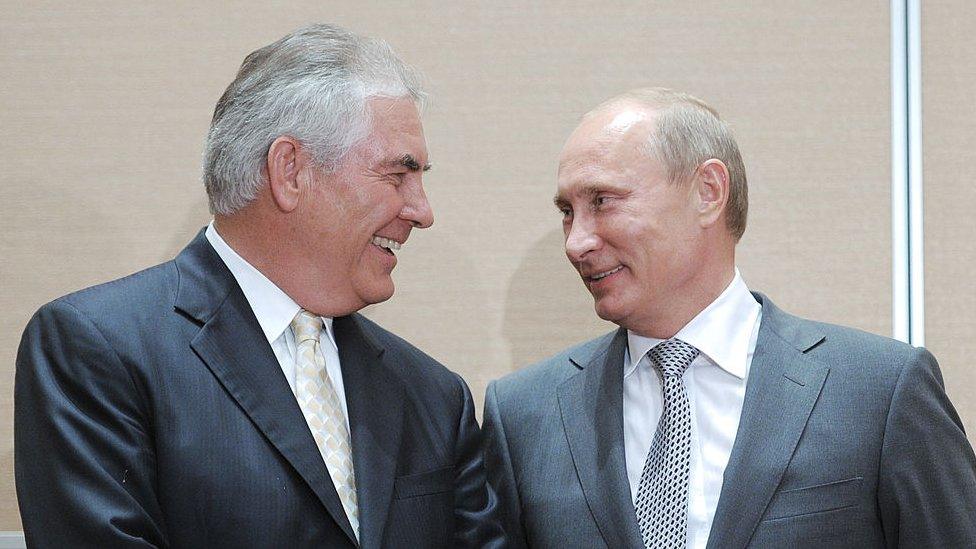
As CEO of Exxon Mobile, Tillerson was awarded the Russian Order of Friendship and had dealings with Russian President Vladimir Putin
Meanwhile alternative centres of power with undefined parameters have emerged: Trump's Chief White House Strategist Steve Bannon has set up a "strategic initiatives" thinktank to inform policy making.
And his son-in-law Jared Kushner has been tasked with taking the lead on foreign policy issues like Middle East peace, with no formal connection to established State Department channels.
Tillerson has his own channel to the president, says his aide, RC Hammond: "The secretary and the president are in frequent contact, meeting in person and speaking regularly over the phone."
The secretary has, however, reportedly been frustrated with the administration over staffing appointments.
The president had promised to let him pick ambassadors for many of the top-tier postings, two people close to the transition process told the BBC.
But they said White House Chief of Staff Reince Priebus circumvented the arrangement by winning Trump's approval for at least 10 nominees before Tillerson was confirmed. These are still going through the vetting process.
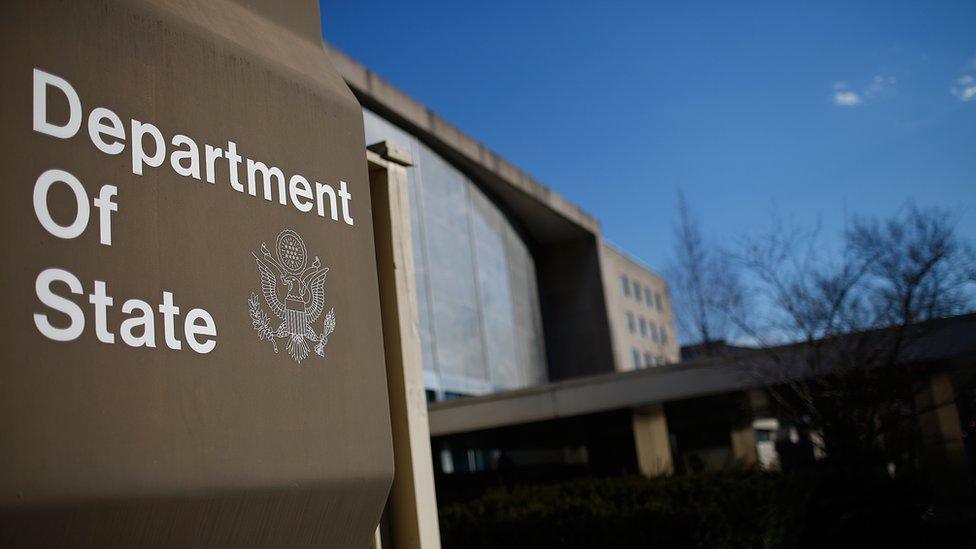
The White House has not yet responded to BBC requests for comment.
Battles between the administration and government ministries over appointments during transitions are not necessarily unusual.
"It sounds like part of the usual Washington game," said a senior State Department official. "But what is unusual right now is the absence of a clear process, of who's in charge of policy formation or policy appointments."
Even if it was clear, the State Department is not fully equipped to help make policy.
The White House did not approve Tillerson's initial choice for a deputy and almost all of the high level jobs are still vacant.
Just two out of the 116 requiring congressional confirmation have been filled, according to the non-partisan organisation Partnership for Public Service: the secretary of state and the UN ambassador Nikki Haley.
Shake ups on the top floor are standard practice in changeovers between administrations, but this one was done "in a manner considered highly offensive to all of us," said the State Department official.
Some were given only 48 hours to vacate their offices and none were left to backfill until new appointments could be made, which is the normal procedure.
Tillerson's role in these decisions was not clear, as much of it happened before he was confirmed.
And there is plenty of expertise on hand to run the department in the meantime. But those who are acting in senior positions do not necessarily wield the same authority as those who've been officially confirmed for the roles, especially in the uncertain policy environment.
We are "treading water" said one career diplomat, noting the difficulty of getting guidance on even routine policy decisions from the top floor.
With such an introduction to the Trump administration the diplomat had been "highly sceptical" about Tillerson's appointment but was "pleasantly surprised" by his debut.
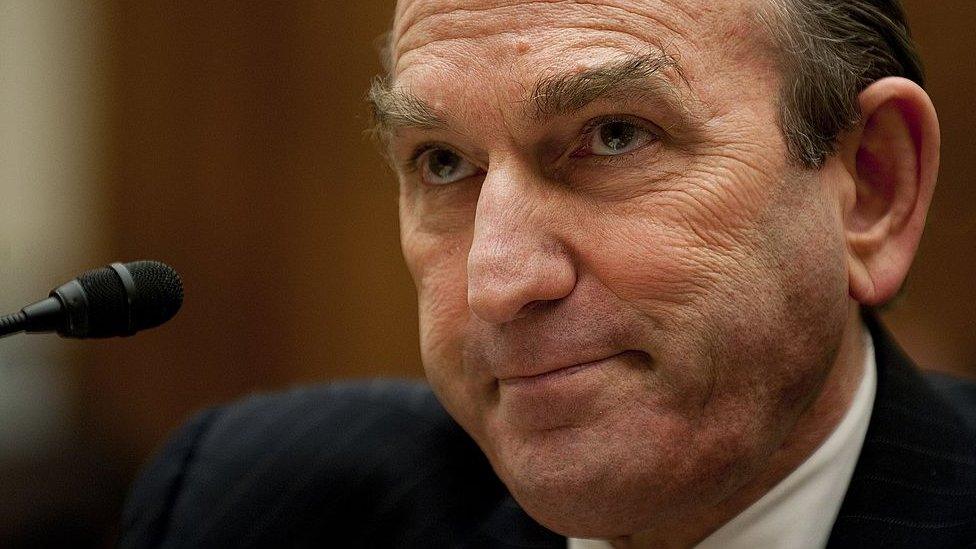
Tillerson had wanted Elliott Abrams to serve as his deputy, but he was disqualified due to negative comments about Trump
He came in strong with an opening speech that said all the right things - promising to make full use of the expertise on hand and suggesting that he'd have an open mind about dissenting opinions.
That is what he seems to be doing, working his way through the building in methodical consultations that include not just senior officials but mid-level officers, as he navigates the steep learning curve from CEO to diplomat. This approach has been well received, although I understand there are concerns that he is not as accessible as was hoped.
I have met Mr Tillerson in off-the-record settings and he seemed to me a thoughtful, deliberate man with an interest in taking a long-term strategic view.
And while he is not anti-establishment in the iconoclastic mould of Mr Trump, he is an outsider - to diplomacy but also to the city. Perhaps that makes him less inclined to play by its rules.
Whether that will work in this town, and with this administration, is too soon to say.